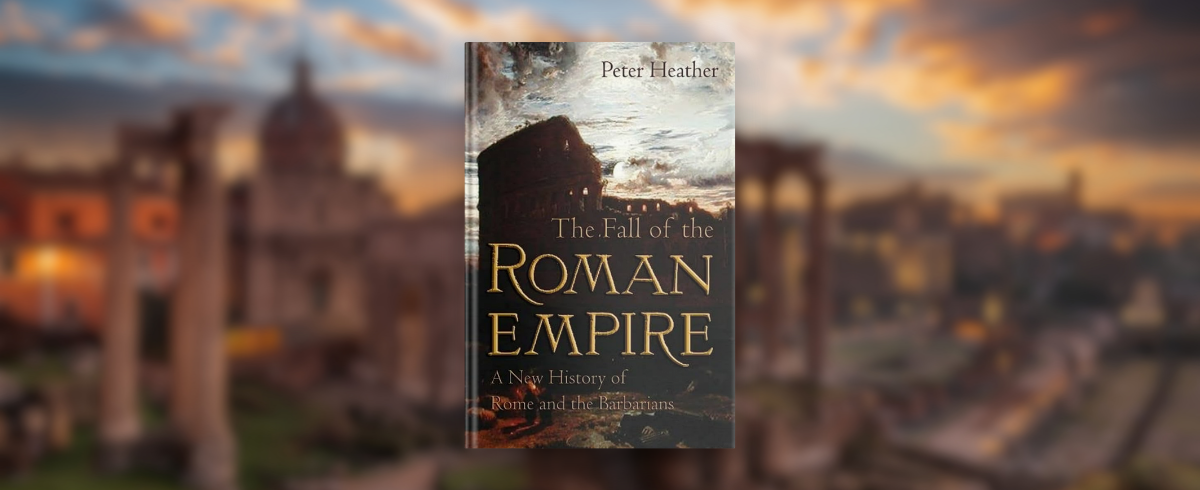Peter Heather has managed the inconceivable: to displace Gibbons (for me at least) as the reference when it comes to explaining the fall of the Western Roman Empire. He very convincingly argues that the rise of the Huns and Goths brought down the Roman Empire rather than internal conflicts and moral decline. He disputes that the Christianization of the Empire had a real impact on the running of the Empire. It brought about a cultural revolution, but did not impact the running of the Empire: “only the nomenclature was different.” Likewise, he argues that splitting the Empire in Western and Eastern parts was necessary to spread patronage throughout a very large population and avoid usurpation.
After thoroughly rejecting the internal causes of collapse, Heather argues that exogenous shocks weakened then led to the fall of the Empire. First the rise of Persia in the East as a competing super power required a mobilization of large troop numbers which left the frontier poorly defended. Then the arrival of the Huns to the borders of the Empire displaced huge numbers of “Barbarians” into the Empire. They became unified in the process. Even when the Romans temporarily contained them, the continuing Western advance of the Huns pressed new waves of invaders into its borders. The more these invaders occupied land and decreased the Empire’s ability to raise taxes to field an army, the weaker it became and the more attractive a target it became.
The loss of Africa to the Vandals was probably the coup de grace as it was the bread basket of the Western Empire and was the source of much of its wealth. Had the Romans succeeded in recapturing it in 468, the outcome might have been different. Their inability to recapture their most productive regions explains why even the collapse of the Hunnic Empire after the death of Attila did not benefit the Western Empire much.
The book is not perfect. The pacing varies dramatically and the book can be a bit tedious at times when it is too detailed or repetitive. Fortunately those parts are far and few between and the book more than makes up for it with its compelling narrative and rich description of its engaging cast of historical characters.
If you have an interest in the Roman Empire, you owe it to yourself to read this book!

Added to my Kindle queue!
Do you think the end of the Republic post-Caesar made any difference? Would Rome have lasted longer as a republic than as a dictatorship?
You should also check out the excellent History of Rome Podcast http://itunes.apple.com/us/podcast/the-history-of-rome/id261654474 which may be the 2nd best podcast in all history…
Greg
Greg: It’s hard to speculate. The Republic was so civil war prone that’s it’s unclear it would have ever created 500 years of peace. That’s not to say dictatorships are better especially as they face grave succession issues. I suppose if Augustus had re-introduced democracy post establishing peace near the end of his reign it might have had a shot, but it’s idle speculation.
Hi Fabrice: just bumped into your blog after many days…great book summary…I had forgotten you were a bit of a history buff…you may want to read 1491, I really enjoyed it though I’m not sure how accurate a survey of pre-Columbian history it is. (side note: saw that dating site you built — very well done for a side project — i have no idea how you’re able to do everything)
cheers and hope all is well!!
Alok: I will check it out! As for the ability to do everything to comes down to ruthless and effective time management. Read: http://www.fabricegrinda.com/books/the-4-hour-workweek-is-shockingly-good-and-may-change-your-life-forever/
I suppose it also helps that I don’t have girlfriend, family, etc. I hear those things take time 😉
I am glad you liked it! I found it more readable than Gibbons’ book, understandable given its more contemporary language and, of course, he’s got also 200 years of historical research to base his book on…
hahaha love the comment
“I suppose it also helps that I don’t have girlfriend, family, etc. I hear those things take time ;)”
not if you find a girlfeind who is a Roman History Buff!!!
save a life Fabrice. her life.
I thought you might find this interesting too! also about Romans…
Could a Single Marine Unit Destroy the Roman Empire?
http://www.popularmechanics.com/technology/digital/fact-vs-fiction/rome-sweet-rome-could-a-single-marine-unit-destroy-the-roman-empire#ixzz1cVTovalY
“It brought about a cultural revolution, but did not impact the running of the Empire”
What an absolute JOKE. You believe that a complete shift in life philosophy… a shift that changes focuses embracing life to embracing the afterlife… would not have an impact on the running of an empire?
Do you also believe that the French government and population converting to Islam would not impact the running of France?
Do you believe that if the majority of Naspers management became devout Muslims, that it would not impact their business decisions? 2030 AD. Heather writes that Naspers declined not because of converting to Islam where they focused on the afterlife, shunning the business life, but because of internal conflicts…
Hahaha wow…. get real dude
Paul: It had a real and profound impact on the empire. I don’t think it’s the reason it fell though. The evidence points to more mundane military defeats…